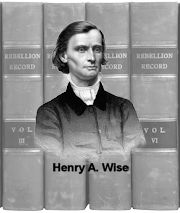March 13.—About nine o’clock this morning six companies of the Seventh regiment New-York Volunteers, encamped at Newport News, Va., started on a reconnoissance on the Williamsport road, running parallel with the James River. Col. Van Schak was in command. At about ten miles distant from camp they came across three hundred and fifty rebel cavalry pickets stationed at the junction of the Williamsport and Great Bethel roads. When the enemy were discovered, the troops were deployed into line and charged upon them. The latter, after firing a few shots at the Union skirmishers, and setting fire to the houses they had lately occupied, turned and fled. Some provisions, etc., were found, which were distributed among the troops.—N. Y. World, March 17.
—This afternoon, while twenty-six of the Union cavalry were foraging on the Strasburg road, three miles from Winchester, Va., they came upon a large barn, bearing evidence of having recently been occupied by Ashby’s men. While the teams were loading with hay, about two hundred of the latter came near, and threw out two companies as skirmishers. The Union men covered the departure of their teams, and prepared to resist an attack, which was finally commenced. At length six Wisconsin pickets came up with rifles, and killed two of the enemy. One of the cavalry dashed upon the rebels, amid a shower of bullets, and killed one of them with his pistol. The enemy made no effort at a charge, but gradually advanced as the Nationals fell back in good order and unharmed.
—Bishop Whittingham, of the Protestant Episcopal Church of Maryland and the District of Columbia, transmitted to all the clergymen of that church in parochial charge in the District, a prayer of thanksgiving for the late Federal victories, to be used on all occasions of public worship within eight days following the Sunday after its receipt—Baltimore American, March 15.
—Gen. Banks, at Winchester, Va., issued an order to the troops under his command, forbidding depredations of any kind whatsoever, and deeply regretting “that officers, in some cases, from mistaken views, either tolerate or encourage” such a course.
—The War Department of the United States, this day ordered, that Joseph Holt and Robert Dale Owen be, and they are hereby appointed a special committee to audit and adjust all contracts, orders, and claims on the War Department, in respect to ordnance, arms and ammunition, their determination to be final and conclusive, as respects this department, on all questions touching the validity, execution and sum due, or to become due upon such contract, and upon all other questions arising between contractors and the Government upon said contracts.
—Gen. Halleck, at St. Louis, Mo., issued an order assuming the command of the Department of the Mississippi, which includes the present Department of Kansas and Missouri, and the Department of Ohio and country west of a north and south line drawn through Knoxville, Tenn., and east of the western boundaries of the States of Missouri and Arkansas.. The headquarters of the Department of the Mississippi will remain until further orders at St Louis.
—Daniel Tyler, of Connecticut, was this day confirmed by the United States Senate, a Brigadier-General of Volunteers in the National army.
—In the House of Representatives of the United States, a resolution was passed tendering the thanks of Congress to Gen. Curtis, and the officers and men under his command, for the brilliant victory at Pea Ridge, in Arkansas.
—The bridge of the Mobile and Ohio Railroad, at a point twenty miles from Jackson, Tenn., was totally destroyed by the third battalion of the Fifth Ohio cavalry, in command of Major Charles S. Hayes. The cavalry landed five miles above Savannah, and made a forced march of thirty miles into the rebel country. Just as the destruction of the bridge was completed, a party of rebel cavalry was discovered and pursued, and two of the party captured.—Cincinnati Commercial.
—Lieut. -Col. Bennet, of the Fifty-first Pennsylvania regiment, Lieutenant Riley of the Forty-seventh New-York, and S. H. Wills, Union Government Agent and Cotton Broker, were captured by the rebel pickets, on Edisto Island, and carried to Charleston, S. C, as prisoners of war.
—Brig.-Gen. Gatlin, of the department of North-Carolina, issued an order, by direction of the rebel Secretary of War, requiring that all cotton, tobacco and naval stores, within that department, shall be removed west of the Wilmington and Weldon Railroad; or, if distant from any railroad or navigable stream, put in such places of security that they cannot be reached by the enemy. Such of the above-mentioned products as are in exposed positions, must be removed at once, and those less exposed, removed or secured by the twenty-fifth instant, otherwise they will be destroyed by the military authorities. The General expresses a hope that the owners themselves will apply the torch rather than see the enemy gain possession of the much-coveted products. —Norfolk Day-Book, March 19.



